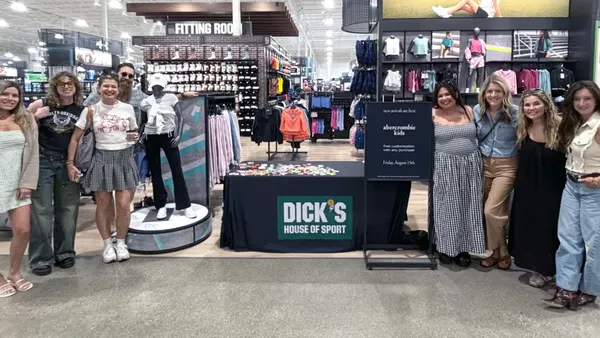Dive Brief:
-
Walmart, whose food concessions tend to be McDonald’s and other inexpensive fast fare, has teamed up with Grown, a new "fast-casual" (and a bit more expensive) effort from Shannon and NBA star Ray Allen.
-
Considering its $9 cold-pressed juices, $6 avocado toast and $11 sandwiches, Grown’s menu doesn’t exactly fit with Walmart’s "always low prices" mantra. Kids portions are less expensive and Grown may soon offer half-portions, according to the foodie site Eater.
-
A Grown concept store has opened at the Walmart Supercenter in Orlando, FL this month, according to an Eater’s report. A request for more information from Walmart wasn’t immediately returned to Retail Dive.
Dive Insight:
Grocery accounts for half of Walmart’s sales, including more than a quarter of its e-commerce sales, according to recent research from Slice Intelligence, and organic food has long been a priority at Walmart. Its relationships with restaurants, however, are generally kept at arm’s length, a Walmart spokesperson told Retail Dive last year.
"It’s a lessee/lessor relationship—we do not operate the businesses," Molly Blakeman explained, saying that consideration of who goes into its stores depends on "a number of things—what fits with our customers, and what also fits within the specifications of our other retail locations."
If a Walmart store already has a McDonald’s in it, the next Walmart store down the road probably won’t, Blakeman says. And not all Walmart restaurant partners are national chains. Some are regional or local. "It’s going to be a destination for our customers no matter what," she said.
The $6-avocado-toast approach seems more appropriate for Walmart e-commerce unit Jet, which Ravi Jariwala, senior director of public relations at Walmart.com, has told Retail Dive enjoys a customer base that is generally younger, more urban and higher spending than typical Walmart customers. That’s what led Walmart to begin selling merchandise from millennial apparel favorites Modcloth and Bonobos — two of Walmart’s many recent e-commerce acquisitions — on Jet. "The plan has been for Modcloth and Bonobos, for some of that product, to be sold through Jet because the demographics they serve are very nicely aligned," he told Retail Dive earlier this month.
But Jet doesn’t have stores, making a restaurant tie-up problematic, if not impossible. Could Walmart be hoping to bring in a new type of customer to its own flagship stores? It has in the past, to little avail.
Nearly a decade ago, for example, the retailer launched "Project Impact," an effort to improve the quality of its apparel and home furnishings, clean up stores and present friendlier customer service. It was widely seen as a disaster. Before that, in 2005, Walmart placed ads in Vogue magazine and sponsored a New York City fashion show to highlight new, higher-priced apparel lines. The result was another disaster — and another retreat.
"To move Walmart upmarket is a Herculean task," Doug Stephens, author of "Reengineering Retail: The Future of Selling in a Post-Digital World," told Retail Dive earlier this year. "Any time they do, they risk losing their most loyal customers. They’ve wound themselves in a corner by virtue of just how strong their brand essence is in the market. When you say ‘Walmart,’ it brings up such clear connotations. For some people it’s what they want, and for some they want nothing to do with it. Buying Jet.com is an attempt to break free from Walmart’s customer base."
While Jet is serving as the front door for younger, wealthier shoppers, Walmart storefronts themselves may be unable to persuade that demographic to change their shopping habits — despite the $6 avocado toast.












